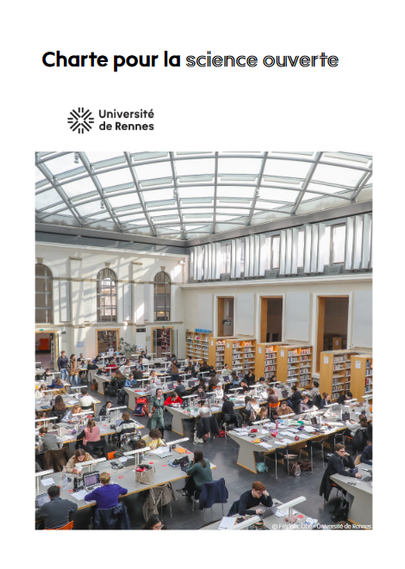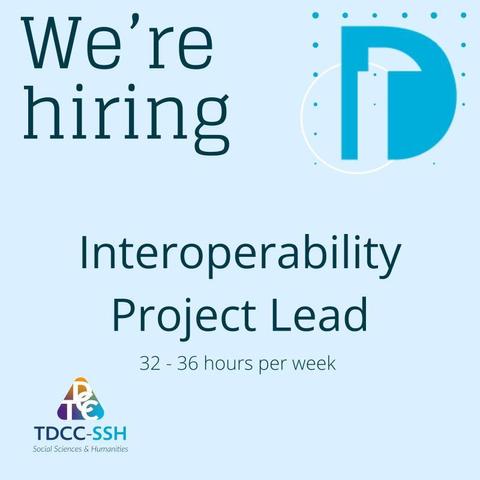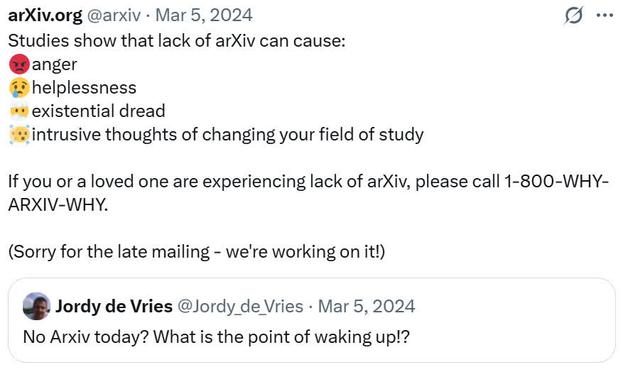L'Université de Rennes se dote d'une charte pour la science ouverte
https://scienceouverte.univ-rennes.fr/actualites/une-charte-pour-la-science-ouverte-luniversite-de-rennes
#openscience #scienceouverte
Recent searches
Search options
#OpenScience
Today we’re reaffirming our unwaivering and longstanding committment to all that is is core to pyOpenSci: Diversity, Equity, Inclusion and Accessibility. We strive to include everyone, everywhere.
From inclusive peer review, mentorship to beginner-friendly training, we’re building a space where everyone can contribute to #opensource in support of #openscience and advancing scientific discovery.
Read more: https://www.pyopensci.org/blog/pyopensci-commitment-inclusion.html

Centre for Open Science Statement on U.S. Executive Orders and the Future of Open Scholarship
https://www.cos.io/about/news/cos-statement-on-the-future-of-open-scholarship
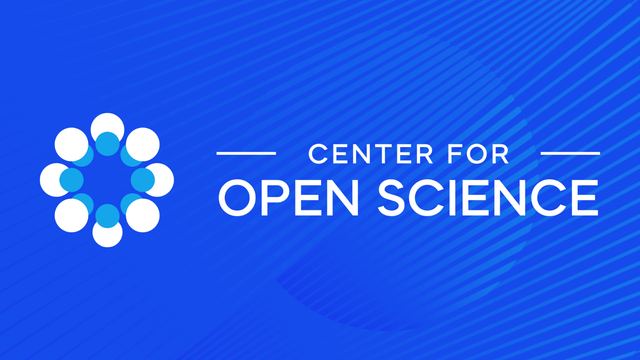
Please boost for reach:
Job opportunity in the Netherlands!
Are you well-versed in #projectmanagement and know the research data/software landscape from a perspective of #interoperability?
We are hiring an Interoperability Project Lead
for a 4-year project funded by Open Science NL.
https://vacatures.knaw.nl/job/Den-Haag-Interoperability-Project-Lead-DANS/1152106555/
Apply until April 13th (Sunday) 2025.
See next post for more information on salary, benefits, etc.
We have a new preprint out, which looks at the nonlinear response of summertime heat extremes across the United States in a collection of new overshoot scenario experiments using the 50-km GFDL SPEAR Large Ensemble: https://doi.org/10.31223/X5TX4P #OpenAccess #OpenScience
Takeaway story: Mitigating earlier has even greater benefits!
February 2025 data is now available for both Antarctic sea-ice thickness/volume (https://zacklabe.com/antarctic-sea-ice-extentconcentration/) and global sea-ice volume (https://zacklabe.com/global-sea-ice-extent-conc/).
Last month's global sea-ice volume remains at record low levels for the month of February in this dataset (GIOMAS).
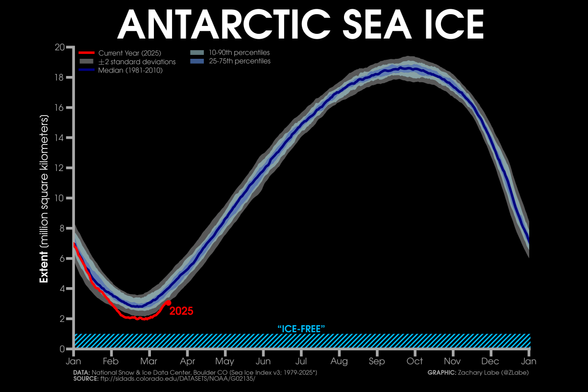
Perhaps most importantly, when you support arXiv, you support . . . your own work!
arXiv promotes scientific advancement by making it fast, easy, & free for you to share your research & discover new science every single day. #openscience
@krazykitty Une piste consiste à se battre sur le terrain de ceux qui réduisent la science à une brique dans la production de valeur marchande : la #valorisation de la recherche.
Depuis 25 ans, on est organisés pour faire émerger des #startup et vendre des brevets et des licences logicielles. Les EPST sont ultras connectés aux entreprises du #capitalisme
En revanche, si on veut développer des techno dans une perspective d'innovation sociale, c'est un peu le désert. Les écosystèmes de l' #ess et de l' #esr se connaissent très mal.
Transférons des techno en #opensource dans des #scop et des #scic. Vive la #ScienceOuverte / #OpenScience
#Arctic climate rankings are now in for January 2025: https://zacklabe.com/archive-2025/

Software Carpentry Workshop – R-Variante
24.–25. März 2025 | Philologicum, LMU München
In diesem praxisnahen Workshop lernen Teilnehmende den Umgang mit Unix Shell, Git und R, um effizienter und produktiver zu arbeiten.
Weitere Informationen und Anmeldung: https://lmu-osc.github.io/2025-03-24-LMU-Humanities/
Die Teilnahme ist kostenlos und offen für Forschende, Mitarbeitende und Studierende. Die Plätze sind begrenzt.
#RStats #Git #Unix #OpenScience #DigitalHumanities #Datenanalyse
My monthly #Arctic temperature graphics have now been updated through January 2025. Though, check out the daily data too... another North Pole winter warming spike is occurring.
Graphs: https://zacklabe.com/arctic-temperatures/ #SciComm #DataViz #OpenScience #OpenData
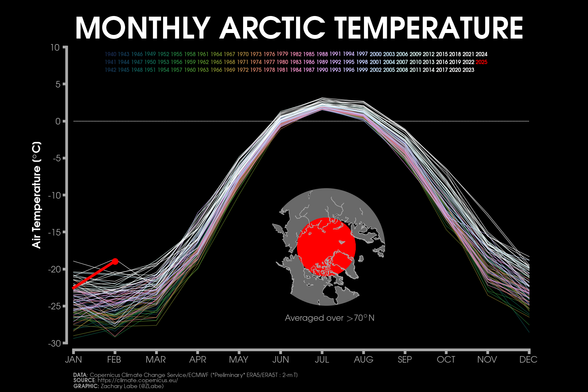
"Clara Sousa-Silva: A couple of weeks ago, I went to look at climate monitoring data that’s collected from ground-based monitoring stations, including one on Mauna Loa in Hawaii. Mauna Loa is the mountain next to Mauna Kea where my telescopes are. We use the Mauna Loa data, which is NOAA Climate Data Record program data, to obtain information about what the sky looks like so that we can remove it from our own data.
But all the data was gone. So I contacted my colleagues who are climate scientists, who basically do the same work as I do, but instead of doing it on atmospheres beyond Earth, they do it for Earth. They started panicking because lots of data was missing, specifically all the CO₂ data was missing.
We then learned that there had been some scheduled maintenance of some databases, but even after the databases came back online, there was still stuff missing intermittently. At one point, a lot of the greenhouse gases data was missing. Then they came back, but not CO₂. Then CO₂ came back.
I contacted my colleagues who use Environmental Protection Agency (EPA) data, and they reported the same thing — their repositories were not accessible. I found out from my colleagues who work at NOAA that there hadn’t been a centralized effort to safeguard this data, which means the only access people have is through online databases. If those become disconnected, even if the data is not deleted, it basically becomes useless."

The scientific publishing system is fucked up.
I believe one of the things you can do as a researcher is only to contribute to journals that don't suck.
But what are journals that don't suck™?
I've written down my criteria here: https://marioangst.com/en/blog/posts/criteria-journals/
#academia #scientificpublishing #bigpublishing #OpenScience
I see this call making the rounds again - let me quote from the mission-statement of @SafeguardingResearch:
"Our archive is built according to the principles of #FAIR and #CARE, based on open technologies and standards, and resilient against loss via meaningfully distributed storage."
Please join us:
"As researchers we often say 'we need the data'. Today, the data needs us." — @KathyReid
see 2/2
https://upstream.force11.org/open-science-call-to-act/
#OpenScience #SafeguardingResearch
1/2
Update. "PLOS [@PLOS] statement on recent US Executive Orders and scientific integrity"
https://theplosblog.plos.org/2025/02/plos-statement-on-recent-us-executive-orders-and-scientific-integrity/
"We are deeply concerned about a range of recent US Executive Orders that collectively have the potential to dismantle the US scientific enterprise as it has existed for the past 70 years…We will not approve changes to terminology or removal of data that compromise the scientific accuracy of content. Requests to remove legitimate authors from manuscripts violate our authorship policies which are grounded in principles of credit, accountability and transparency…We are actively working to understand the evolving implications of these directives and the disruption they have brought…We remain dedicated to the advancement of #OpenScience."
I've never understood how scientists, in particular, could flee from that Musk place only to take refuge in, wait for it, a Bannon place like #BlueSky.
"On social media, Mastodon is managed and run by the community (e.g., https://neuromatch.social is a server run by neuroscientists) and is robust by design."
https://www.thetransmitter.org/policy/science-must-step-away-from-nationally-managed-infrastructure/
When rogue players multiply, single points of failure are worse than just a gamble.
#openscience is best on the #fediverse
"How disruptive would it be if GitHub started deleting repositories, or Google Scholar started hiding certain papers in response to U.S. government demands?"
https://www.thetransmitter.org/policy/science-must-step-away-from-nationally-managed-infrastructure/
Most people with some interest have seen precisely this coming for more than a decade. @neuralreckoning is among them. It's great that outlets like @thetransmitter are now also recognizing this problem and are helping to amplify these voices.
@neuralreckoning @thetransmitter
So well put!
We should start lobbying at our own institutions for this vision.
A federated scientific infrastructure, run by universities/libraries/funders etc The #fediverse for #openscience
"Just imagine a world in which universities mutually support one another by building scientific infrastructure based on free sharing, giving every country, from the poorest to the richest, secure access to the scientific data that can change the world for the better."
8/ Cette avancée montre que la recherche publique peut mener des projets ambitieux pour l’avenir énergétique. Le PP soutien la recherche publique dans cette dynamique, pour que les bénéfices profitent à tous !
Update. From @mayank_mchugh and @JACoates at @force11: "Science is Under Siege: The Open Science Community Must Act and Lead by Example"
https://upstream.force11.org/open-science-call-to-act/
"The new US administration has thrown the entire academy into chaos, threatening global health. This article is a call for the #OpenScience community to practice what it preaches and lead by example in defending science…The only viable line of defence against such rapid and intense attacks is transparency and a heightened rigour. And it is here that the open science community has a unique and essential role in this very moment."


